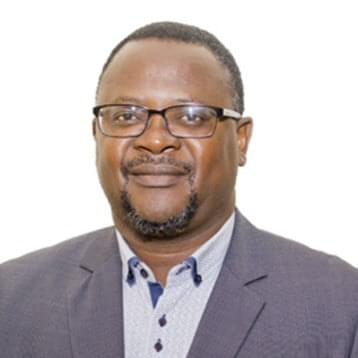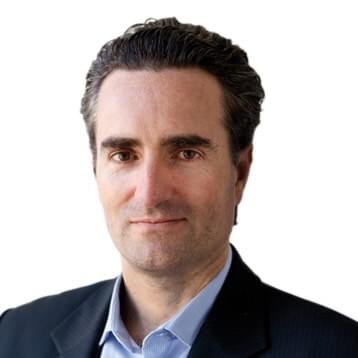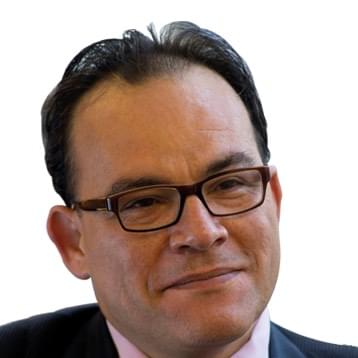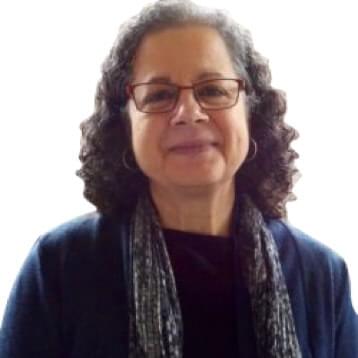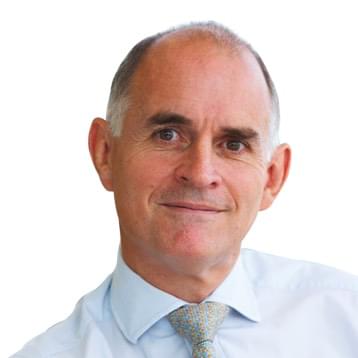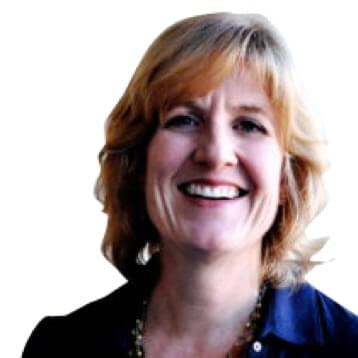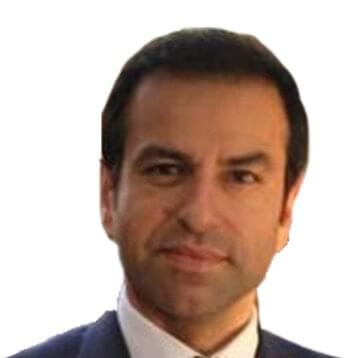Summary of impact
In the past twelve months, Crisis Action has coordinated coalitions and campaigns that have helped drive meaningful change for civilians caught up in conflict. With our partners and allies, we:
Yemen
- Helped prevent an attack on the vital lifeline of Hodeidah port that enabled aid to continue to flow to millions of people, by driving global media and political attention about an attack’s dire implications for civilians.
- Helped spur a breakthrough ceasefire agreement for Hodeidah and a consequent 68% reduction in local fatalities.
- Coordinated targeted media coverage and advocacy to demand an end to United States (US) backing for the war in Yemen, with the result that for the first time the US Congress invoked the War Powers Act and voted to curtail US support for the war.
- Encouraged the governments of the US, France and the United Kingdom (UK) to stop selling arms to Saudi Arabia and the United Arab Emirates (UAE), given their use in killing Yemeni civilians.
68% reduction
in fatalities
South Sudan
- Helped bring about a new power-sharing agreement by supporting civil society involvement in peace talks.
- Successfully campaigned for the United Nations (UN) Security Council to renew its arms embargo and targeted sanctions on South Sudanese leaders.
- Helped to cut off the illicit supply of money to South Sudan from neighbouring countries, which enables the war to flourish, by sparking a crackdown on money laundering by the Kenyan Central Bank, closure of suspicious South Sudanese bank accounts and a ban on illegal logging.
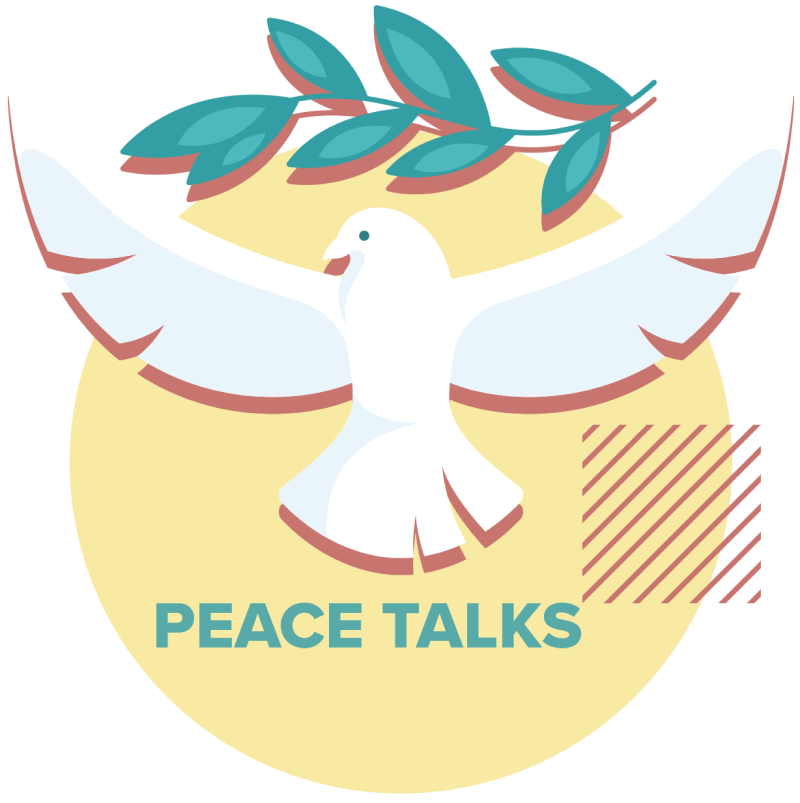
Syria
- Enabled a large increase in the coverage of Russia’s role in fuelling the Syrian conflict in independent Russian media, which contradicted the Russian government line, provoked public debate in Russia and stoked Russian public opposition to the war.
- Helped forestall a full-scale attack on the city of Idlib by keeping a spotlight on the suffering of trapped civilians and the potentially disastrous implications of an attack.
- Helped prevent a ‘normalisation’ of relations between Syria and the West, including by highlighting the plight of people detained, ‘disappeared’ and tortured by the Assad regime.
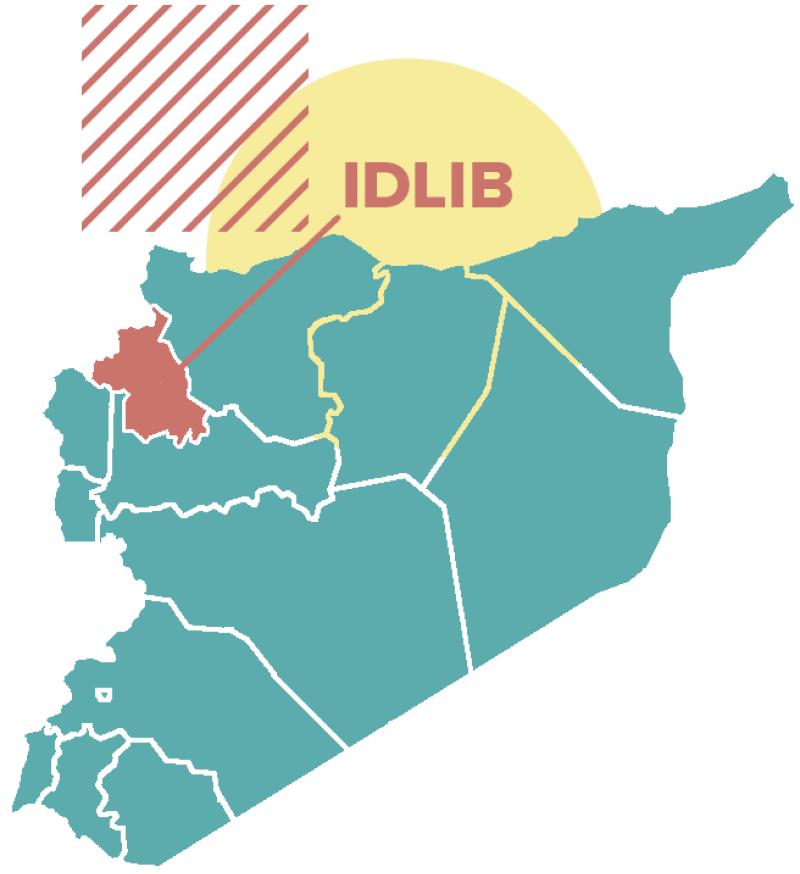
Sudan
- Helped spur a breakthrough power-sharing deal between the military and civilians, by encouraging the African Union (AU) to take strong measures against those opposing the transition to civilian-led government.
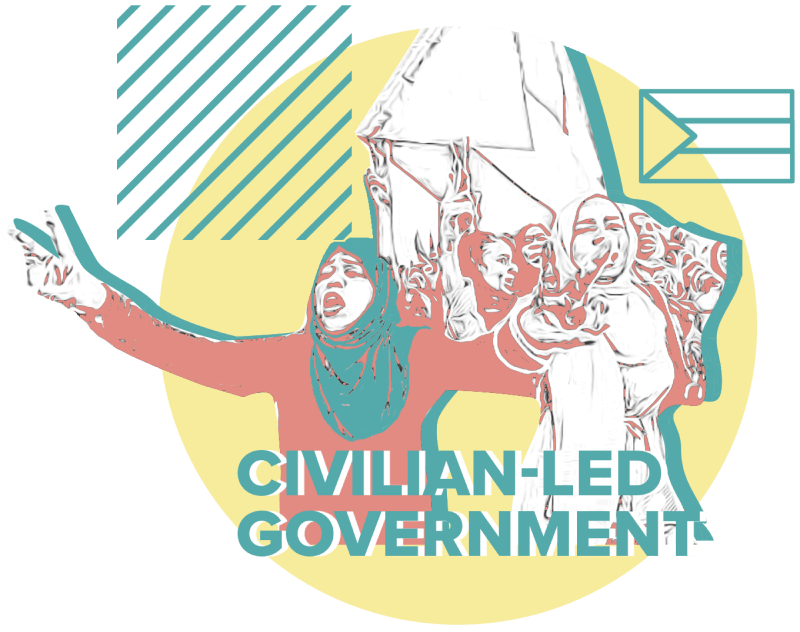
Statement
from Board Chair & Executive Director

Arnold Tsunga
Board Chair


Andrew Hudson
Executive Director

2019 marks Crisis Action’s 15th anniversary. In that time, we have grown from one person to a truly global team of 50, based in more than 10 countries. From 14 founding partner Non-Governmental Organisations (NGO) in 2004, we now work with over 150 partners and our budget has grown to over $5 million. We pay tribute to Crisis Action’s previous Executive Directors – Guy Hughes, Brendan Cox and Gemma Mortensen – and Board Chairs – Paul Ingram, Nick Grono and Jan Egeland – who helped us get here. Read more about the highlights of our 15 years.
This report covers our work from July 2018 to July 2019. It has been a year where the world has seemed to fracture, and the multilateral system has faced existential threats. Yet, at the same time, we saw growing interest in the power of collective action. And a seemingly forgotten war in Yemen became the primary foreign policy concern of key western powers, in part thanks to civil society campaigning.
From empowering inspirational activists to push back against closing civic space in Sudan, to working with brave Russian journalists to tell stories about war crimes in Syria that their government wanted to suppress, much of what Crisis Action does is about enabling amazing individuals to have maximum impact. At the same time, Crisis Action also helps change the system and uphold the rule of law: from highlighting the role of the finance sector in perpetuating the conflict in South Sudan, to working with Parliaments and Congress in the UK, France and the US to hold governments to account.
We are incredibly proud that for the first time, Crisis Action’s unique model has been replicated and a new organisation – Digital Action – has been created. You can read more about Digital Action here.
Thank you to everyone in our global network that enables us to continue to build innovative collaborations to save lives.
15 Years of Impact
At Crisis Action, we have a mantra of “unreasonable optimism”. Over 15 exciting years, Crisis Action has demonstrated unreasonable optimism in the face of some of the world’s most dire conflicts. We have convened powerful collective action to change high-level policy in over 30 different war zones. Some highlights of the impressive collective impact from the last decade and a half include:
2007
Prevented President Mugabe from torturing civilians by stopping the supply of bank note paper to the Zimbabwean regime.
2007
Organised a global day of action in 40 countries in protest against the gunning down by military forces of peacefully protesting monks on the streets of Myanmar. This helped pressure the European Union (EU) to place sanctions on senior military figures and bring about the first ever UN Security Council Presidential Statement on Myanmar, measures that helped to stop the violence.

Actress Thandie Newton blowtorching a Barbie doll to signify the suffering of young people, as part of a campaign protesting the war in Darfur.
2010
Built a powerful NGO coalition in response to the mass rape of between 300 and 1000 women and children in the Democratic Republic of the Congo (DRC) by security forces, which led the UN to launch an investigation that publicly named the perpetrators and resulted in the prosecution and imprisonment of key commanders.
2010-11
Helped ensure the secession of South Sudan from Sudan was largely peaceful via a year-long global mobilisation campaign called Sudan365, which included a music video featuring Pink Floyd, The Police and Radiohead that made the top 10 in many countries, was downloaded millions of times, and featured on the home pages of YouTube and MTV.
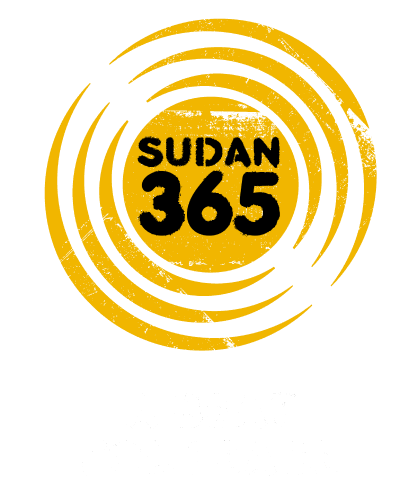
2011
Brought together 200 Arab organizations from 18 countries in the Middle East to support the Arab League’s unanimous and unprecedented request for a no-fly zone, which prevented a massacre in Benghazi, Libya.
2011
Mobilised a global public response through the #WithSyria campaign to get agreement for UN cross-border aid convoys to reach three million starving Syrians. This was the first time the UN had delivered aid from outside any country and this cross-border aid continues today.
2012
Helped secure the first coordinated regional strategies by the AU, UN and US to stop the havoc being wreaked by the feared Lord’s Resistance Army; consequently, casualties fell by over 90%.
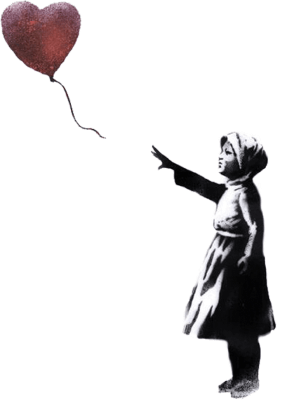
Banksy re-released his iconic ‘Girl with Balloon’ piece in support of the Crisis Action-coordinated #WithSyria campaign.
2013
Drove a landmark EU decision to close settlement policy loopholes, which helped revive peace talks between Israel and Palestine.
2013
Built an unprecedented platform of Christian and Muslim religious leaders from Central African Republic, who convinced the UN to deploy peacekeeping forces to the country. This stopped ethnic cleansing from spiralling out of control and saved thousands of lives.
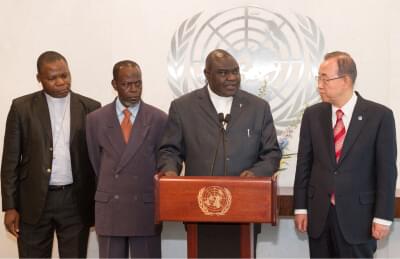
Religious leaders from CAR meeting with then UN Secretary-General Ban Ki-moon, as organised by Crisis Action.
2016
Contributed to the successful negotiation of a political agreement in the DRC that averted potentially widespread violence and led to a peaceful transition of leadership in 2018.
2016-19
Prevented an attack on the vital lifeline of Hodeidah port in Yemen that enabled aid to continue to flow to tens of millions of people.
2018
Helped procure a ceasefire agreement in South Sudan that significantly reduced deaths by ensuring that South Sudanese women and young people were directly involved in peace talks and pressuring the UN to impose, for the first time, targeted sanctions and an arms embargo.
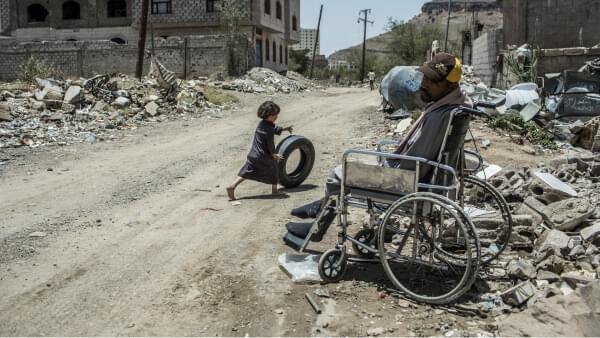
Yemen
Impact
Once a forgotten conflict, Yemen has now become a hot political issue, debated by the US Congress and US presidential candidates, the subject of rulings in the UK High Court and parliamentary investigations in France, and a source of tension between co-belligerents Saudi Arabia and the UAE.
Steadfast and strategic campaigning by Crisis Action and our Yemeni and international partners has pushed the conflict into the headlines and in front of policymakers and kept it there. We have also amplified Yemeni voices in the debate and made it increasingly hard for the warring parties and their backers to continue on the same course.
Timeline 2018
- Aug Saudi airstrike on school bus in Sana’a kills dozens of children
- Oct Over 40 Yemeni civil society leaders meet for the first time in Addis Ababa, a gathering organised by Crisis Action
- Nov Mwatana co-founder Radhya Almutawakel visits US, meets with Senator Bernie Sanders and other officials; US military announces it will stop refuelling Saudi/UAE aircrafts over Yemen; Leaders of five major humanitarian organisations issue groundbreaking call for end to US support for Yemen war
- Dec Yemeni government and Houthis sign ceasefire agreement in Stockholm; US Senate invokes War Powers Act and votes to end US support for Saudi/UAE coalition
Timeline 2019
- Jan French parliament holds hearing on France’s arms sales to Saudi Arabia and UAE
- Mar Radhya Almutawakel testifies before US Congress; Germany announces it will extend a moratorium on arms sales to Saudi Arabia
- Apr For first time in history, US House of Representatives and Senate both pass War Powers Act resolutions to end US military support for Saudi/UAE coalition, but President Trump vetoes
- May Houthis announce military withdrawal from Hodeidah; US government uses legal loophole to advance $8 billion in arms sales to Saudi Arabia and the UAE
- Jun UK High Court rules that arms sales to Saudi Arabia are illegal
- Jul UAE announces it will end involvement in Saudi-led coalition fighting Houthis and redeploy most troops out of Yemen; US Congress votes to block billions in arms sales to Saudi Arabia and UAE; President Trump vetoes
Keeping the vital Hodeidah port open…
Last year’s annual report recounted how an international outcry in July 2018 forestalled an expected UAE-led attack on the vital port city of Hodeidah that could have killed up to 250,000 people. In the months that followed, Crisis Action and partners continued to sound the alarm and UN officials have now confirmed that the threat has receded, meaning this vital supply line for food, fuel and medicine for millions of Yemeni civilians remains open.
The UN Humanitarian Coordinator for Yemen, Lise Grande, told Crisis Action and our partners: “Crisis Action has changed the way that people with decision-making power see the crisis in Yemen,” and said the campaigning we coordinated with partners was the most successful she had seen in her 25-year career.
By helping me understand the politics underlying US support for the war in Yemen, as well as connecting me with key sources on the ground, Crisis Action bolstered CNN’s reporting, and significantly increased its impact with policymakers and the public.
Senior International Correspondent, CNN
…And supporting a breakthrough ceasefire
The Hodeidah crisis moved Yemen up the political and media agenda, and against this backdrop of increased attention, the UN Special Envoy for Yemen launched new ceasefire talks. In December 2018, the parties to the conflict met in Sweden for the first serious negotiations in more than two years, and agreed a ceasefire for Hodeidah. In the following months, local casualties fell by 68%.
The Stockholm Agreement represented the biggest breakthrough in more than four years of war, and a UN contact told us they had “never seen humanitarian advocacy so successfully support a peace process.”
In the end, the international response to the threatened assault on Hodeidah was so severe that the UAE not only decided to abandon the attack, but also announced in July 2019 that they would withdraw the majority of their troops from Yemen.
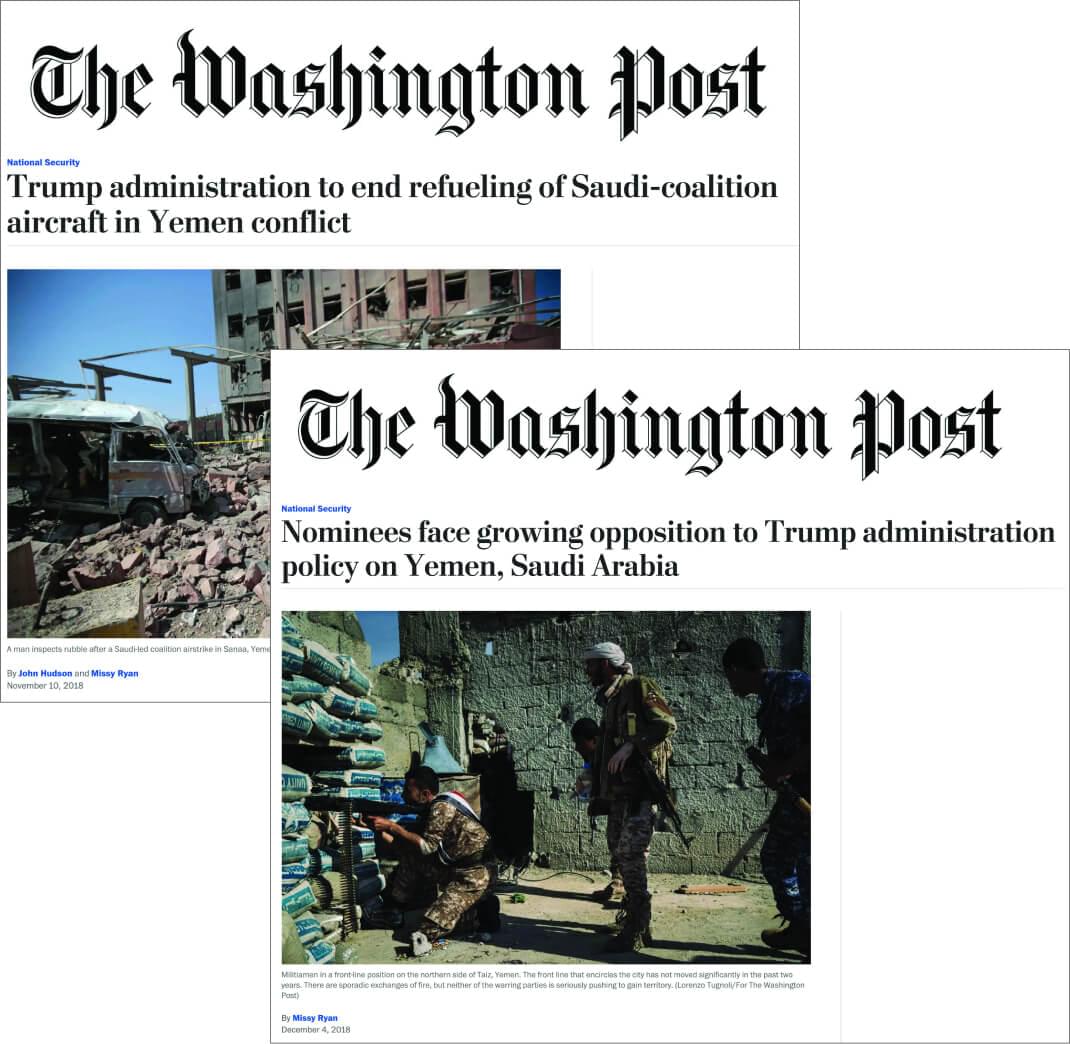
Pressure over arms sales
In the past year, Crisis Action has helped shift political and public perceptions of the legality and morality of weapons sales to Saudi Arabia and the UAE for use in Yemen. The UK, US, France and Germany have all come under pressure to suspend arms sales to both governments.
In June 2019, our partners, Campaign Against the Arms Trade, won a huge victory when the UK High Court ruled that British arms sales to Saudi Arabia were unlawful. The government is appealing the ruling, but in the meantime has suspended the issue of further export licences.
In France, Crisis Action helped support and inform a ground-breaking parliamentary fact-finding mission on arms exports. We also worked to amplify media reports that highlighted how French-sold weapons were being used in Yemen, contrary to government assertions. In the wake of this coverage, dockworkers refused to load a ship with weapons bound for Saudi Arabia.
In Germany, Crisis Action coordinated an open letter from leading NGOs, which helped persuade the government to extend a moratorium on arms sales to Saudi Arabia.
Our partnership with Crisis Action is truly priceless, and the way they work is so clever. Reducing the suffering caused by conflict takes collaboration, intelligence, creativity, and sharp focus on impact – and that’s exactly what Crisis Action brings.
Co-founder and Executive Director, Mwatana for Human Rights
Rising opposition by US Congress
Perhaps the biggest political change on Yemen has been in the US, where for the first time both houses of Congress have voted repeatedly and across party lines to end US military support for the Saudi/UAE intervention in Yemen.
The initial vote came in the wake of a huge campaign coordinated by Crisis Action, which included joint messaging from CEOs of leading aid agencies, widespread media coverage in the most influential outlets (including CNN, The New York Times, The Washington Post and The Wall Street Journal), synchronised engagement by NGO partners with congressional offices, ads by partner NGOs in local newspapers of key senators and members of Congress, and high-profile visits by Yemeni human rights advocates to Washington.
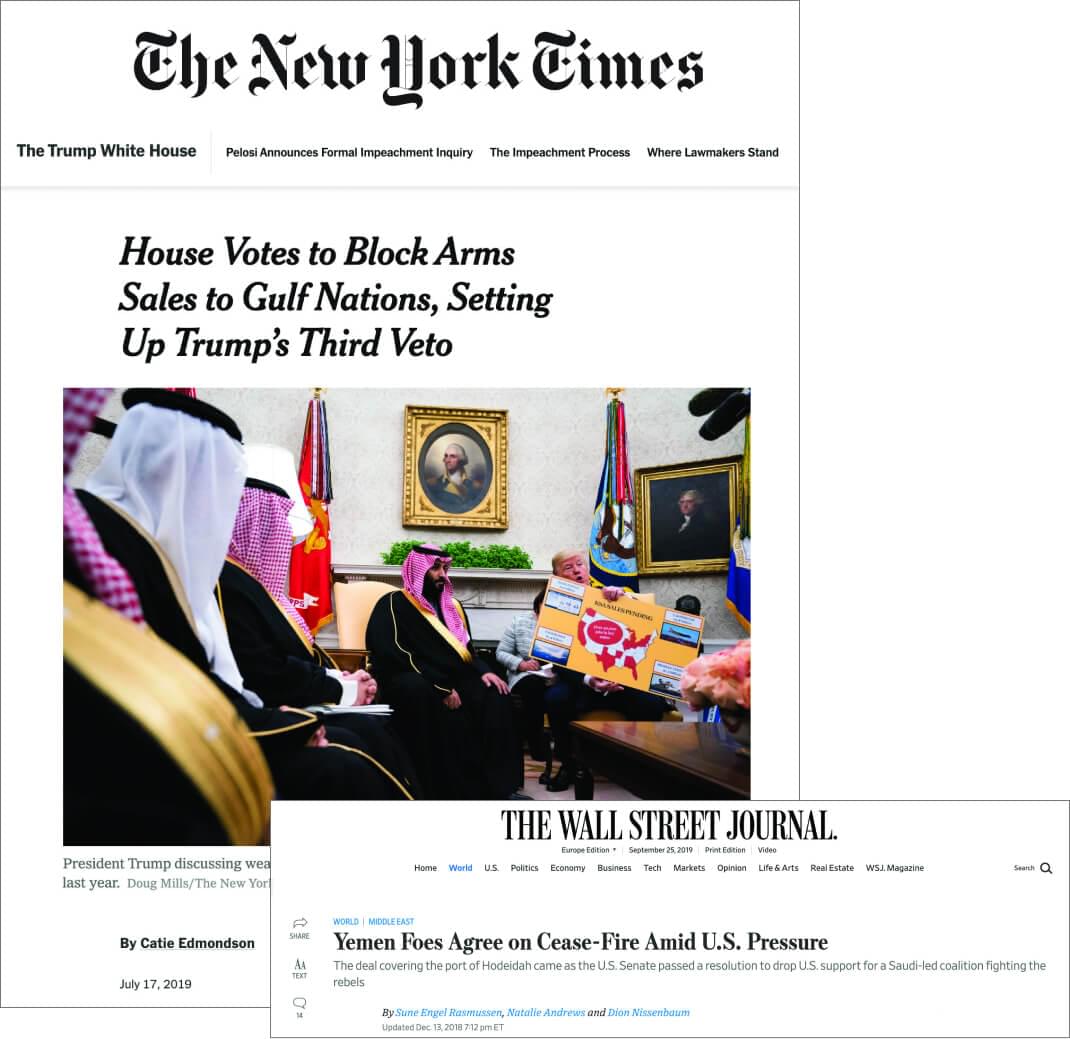
Crisis Action supported Radhya Almutawakel, co-founder of Mwatana for Human Rights, to become the first-ever Yemeni woman to testify before Congress. Radhya was also selected as one of Time magazine’s 100 most influential people of 2019, following a Crisis Action nomination, and her work with Mwatana was cited by Bernie Sanders in a speech to Congress.
Revealing the extent of his support for the Saudi and Emirati regimes, President Trump chose to veto not only the congressional resolution under the War Powers Act that would have ended US support for the war, but also three subsequent congressional resolutions that would have halted the sales of tens of thousands of US bombs to Saudi Arabia and the UAE.
Today I met with courageous activists @ralmutawakel and @ralfaqih from Yemeni human rights group @mwatanaen. They talked about the crisis in Yemen, and how important it is to end U.S. support for this disastrous war. pic.twitter.com/SSu7AupO7e
— Bernie Sanders (@SenSanders) November 15, 2018
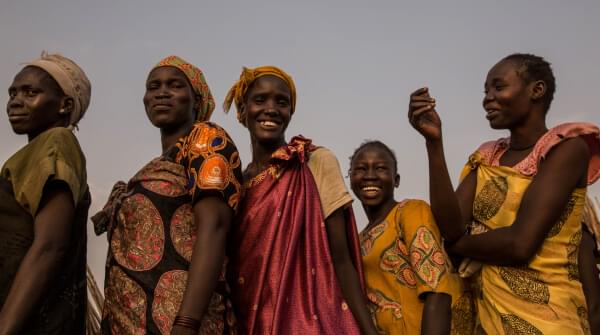
South Sudan
Impact
In September 2018, seven years after the world’s youngest country gained its independence from Sudan, and five years after the outbreak of civil war, the warring parties in South Sudan signed another peace deal in place of earlier efforts that had collapsed. This time, violence fell by an estimated 60%.
The deal, signed in the Ethiopian capital, Addis Ababa, was mediated by Sudan, Uganda, and the Intergovernmental Authority on Development (IGAD). Crisis Action supported civil society – particularly women – to participate in the talks, and an IGAD official subsequently said this was critical for helping to secure the deal.
Since then, Crisis Action has focused on promoting implementation of the agreement, including by continuing to help South Sudanese civil society voices to be heard, campaigning for targeted sanctions and a UN arms embargo to be renewed, and addressing the underlying drivers of the conflict.
Timeline 2018
- Sep Warring parties sign new peace deal: The Revitalised Agreement on the Resolution of the Conflict in South Sudan
- Oct The Profiteers documentary release on YouTube reveals how Kenyan and Ugandan banks are facilitating state looting in South Sudan
- Nov Staff from an official ceasefire monitoring team assaulted in Juba while undertaking a fact-finding mission; Governor of Yei River State suspended after The Profiteers implicates him in illegal trading in teak
- Nov Médecins Sans Frontières reveals 125 women have been sexually assaulted in Bentiu; Research reveals Uganda has been channelling arms to South Sudan in breach of arms embargo
Timeline 2019
- Apr UN Panel of Experts reports that two prominent South Sudanese opposition leaders, Samuel Dong and Aggrey Idri, who disappeared in 2017, were killed in Juba
- May Parties to the peace agreement agree to a 6-month extension of the pre-transition period; UN Security Council renews sanctions and arms embargo against South Sudan
- Jun South Sudan Council of Churches issues strong statement condemning stigmatisation of survivors of sexual and gender-based violence; Media reports reveal existence of a contract between a US-based lobby group and the Government of South Sudan aimed at undermining implementation of the peace agreement
- Jul Secretary-General reports that the Government of South Sudan has not taken measures to protect children from the harmful effects of conflict
Incentives for peace
In May 2019, in the run-up to a critical UN vote on the renewal of targeted sanctions and an arms embargo, Crisis Action coordinated a concerted global campaign with partners and allies in support of renewal.
A particular focus of the campaign was persuading African UN Security Council members, South Africa, Equatorial Guinea and Côte d'Ivoire to not obstruct the vote. Alongside joint letters and a social media campaign, we helped mobilise local campaigners to place nearly 100 calls to these governments, both in New York and in national capitals, asking them not to block the vote.
Civil society is increasingly harassed, oppressed and intimidated in South Sudan. Crisis Action’s support enabled us to work with our brothers and sisters in the region and successfully lobby for the renewal of sanctions and the arms embargo at the UN.
Movement Coordinators, Africans Rising
We also supported two inspiring South Sudanese women leaders to travel to the US to meet policymakers at the UN and in Washington, DC. They gave first-hand accounts of continued human suffering, including sexual and gender-based violence, and spoke powerfully about the need for sustained diplomatic and political pressure on South Sudan.
The Security Council voted in favour of renewal, in spite of tough lobbying from South Sudan, and the African members of the Council abstained rather than voting against renewal. Several UN diplomats thanked Crisis Action for all the work that went into getting the critical vote over the line.
The testimonies of South Sudanese civil society leaders at the UN were an important part of getting targeted sanctions renewed. It’s this combination of compelling local partners and global geopolitical understanding that makes Crisis Action so effective.
Australian Ambassador and Deputy Permanent Representative to the United Nations
Addressing the drivers of conflict
A highlight of Crisis Action’s work on South Sudan in the past year was our collaboration with filmmaker John Allan Namu from Africa Uncensored on his documentary, The Profiteers.
The film – viewed over 260,000 times on YouTube in the fortnight following its release, and also screened on Ugandan TV – exposes how South Sudan’s elite are plundering their country and laundering the proceeds through banks in Kenya and Uganda. It highlights the complicity of members of the Kenyan and Ugandan elite, and the risks posed to those countries’ financial systems.
Crisis Action worked closely with the filmmaker, helping to identify and link him to expert sources. Once the film was launched, we supported its widespread dissemination. We worked with partners to organise screenings in Kampala, Berlin, Brussels, Nairobi, London and Washington, and with the Institute of Economic Affairs in Kenya to publish a policy brief with technical recommendations, which argued that reducing illicit financial flows was in Kenya and Uganda’s interests.
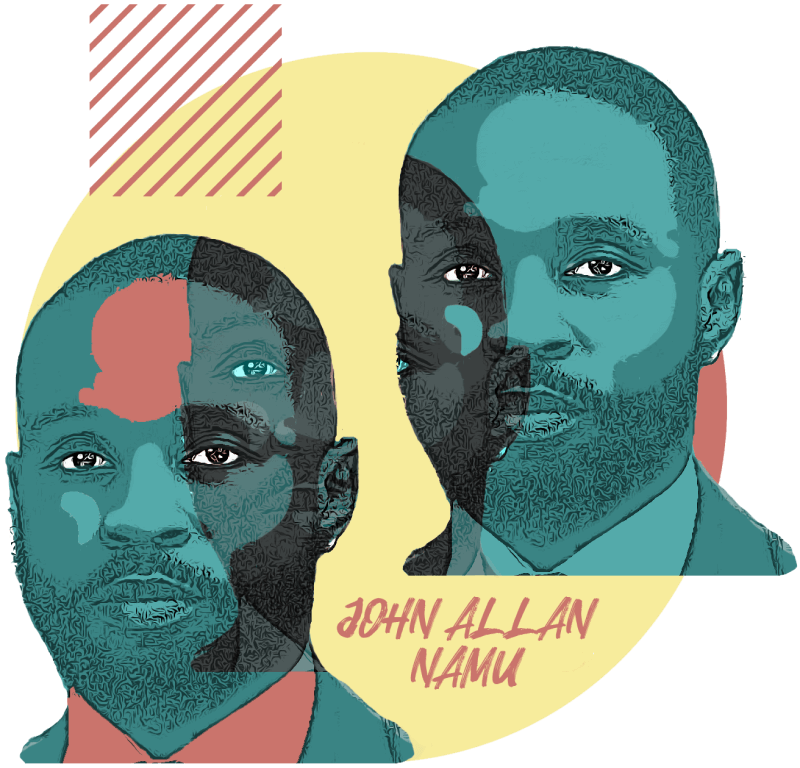
The documentary sparked public debate in the East African Community, generated widespread media coverage and social media engagement, and led to protests on the streets of Nairobi. South Sudan’s President, Salva Kiir, and General Paul Malong, who featured in the film, rapidly responded to the documentary on national TV.
The impact was remarkable: the Kenyan Central Bank ordered banks to enforce Kenyan anti-money-laundering laws and took measures to close loopholes, some suspicious South Sudanese bank accounts were closed, and the Kenya Bankers Association issued a statement, promising to help ”ensure the perpetrators of economic crimes are brought to task.” The governor of Yei River State was fired for his role in looting South Sudan’s natural resources, Ugandan individuals exposed in the film as involved in the illegal timber trade are being investigated by the police, and Ugandan and South Sudanese authorities agreed to enact measures to ban illegal forest logging and trade along their common borders.
Crisis Action helped us expose the bribery and money laundering that fuels the conflict in South Sudan, and the role neighbouring countries have played. This joint work ignited conversations about the looting of South Sudan and had tough consequences for some of the politicians responsible.
Investigative Journalist and Co-founder, Africa Uncensored
Africa Uncensored was the deserved recipient of the TRACE Prize for Investigative Reporting for The Profiteers. The judges called the documentary “a triumph that any mainstream newsroom would envy.” John Allan Namu also won the Journalist of the Year award at the Annual Journalism Excellence Awards hosted by the Media Council of Kenya, where his colleagues Samuel Munia Wakaba and Elijah Kanyi were also feted.
This work demonstrates the effectiveness of creative and bold tactics, unusual collaborations, targeting the financial sector to drive high-level change and the power of film.
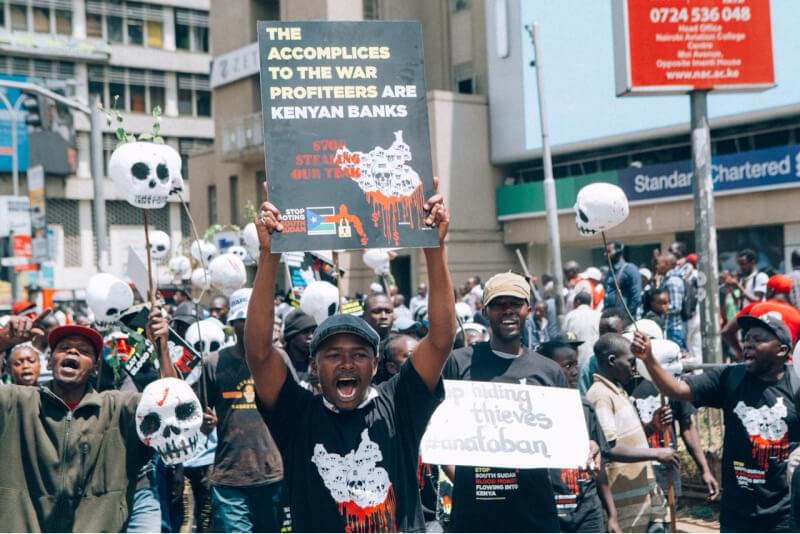
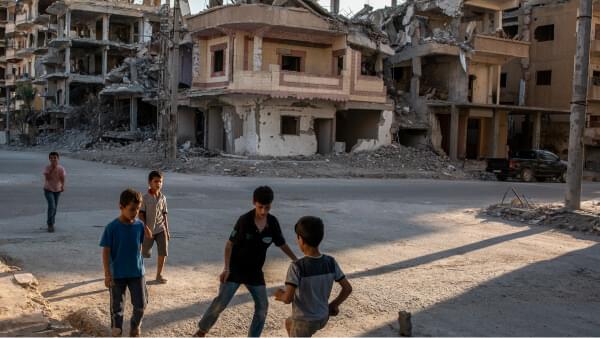
Syria
Impact
Eight years after a peaceful uprising opposing his rule, President Assad has reasserted control over the majority of the country. The costs of this conflict are sky-high: hundreds of thousands of people are dead, and millions more displaced. Swathes of the country have been reduced to rubble, and international laws and norms have been trampled.
In the past year, Crisis Action has focused on helping to prevent a humanitarian crisis in Idlib, changing the narrative on the conflict in the Russian media, and preventing a ‘normalisation’ of relations with the Syrian regime.
Timeline 2018
- Jun World leaders largely shun World Cup opening ceremony in Russia; President Macron meets with President Putin to demand action to deliver humanitarian assistance to besieged Syrians
- Sep 25 eminent jurists issue a joint statement on the legal obligations of donors regarding reconstruction in Syria; Turkey and Russia agree a ceasefire and memorandum of understanding on Idlib under the Sochi Agreement
- Dec UN renews resolution allowing cross-border aid
Timeline 2019
- Jan Olga Bobrova, journalist at Novaya Gazeta, receives annual Russian government Media Award
- Feb/Mar Russian journalists travel to Lebanon, Turkey and Europe to meet Syrian refugees and witnesses of war crimes and human rights abuses
- Mar Syrian and international NGOs brief EU ambassadors ahead of donor conference, and conference outcome document has entire section dedicated to detainees and missing persons; Over 40 activists, experts and opinion-shapers from Russia, Syria and Europe meet in Berlin to share information and co-strategise
- Apr First Syrian refugee with a disability briefs UN Security Council; Russia breaches Sochi Agreement ceasefire and begins air assault on Idlib with Syrian regime, targeting hospitals and civilian infrastructure
- May Novaya Gazeta reports that, for the first time, majority of Russian population is opposed to war in Syria
Idlib: preventing a humanitarian disaster
As regime forces have battled the armed opposition and other groups, an estimated 2.5 million people – some rebels, but the vast majority civilians – have ended up sheltering in the province of Idlib in the northwest of the country. With the Turkish border closed, this is the last refuge available to them. Crisis Action has worked to focus attention on the plight of civilians.
We supported Syrian doctors to travel to Europe and New York to tell policymakers about targeted attacks on their hospitals, and also helped facilitate a briefing of the UN Security Council by Susannah Sirkin of Physicians for Human Rights in July 2019. These interventions helped convince the UN Secretary-General to open an investigation into the bombing of hospitals and contributed to the (brief) renewal of the ceasefire by Russia.
In the same month, Crisis Action coordinated a partner campaign calling on Pope Francis to use his influence with Russian President Putin, which reached almost seven million people on Twitter and was covered by media in Russia, Italy, Germany, France and the Middle East. The Pope sent a letter to Putin asking him for concrete initiatives on behalf of the Syrian population, including the protection of civilians in Idlib.
When I fled the war in Syria four years ago, I never thought I would become the first person with a disability to address the United Nations Security Council. But thanks to Crisis Action, I was able to tell the international community "nothing about us without us."
Syrian Activist
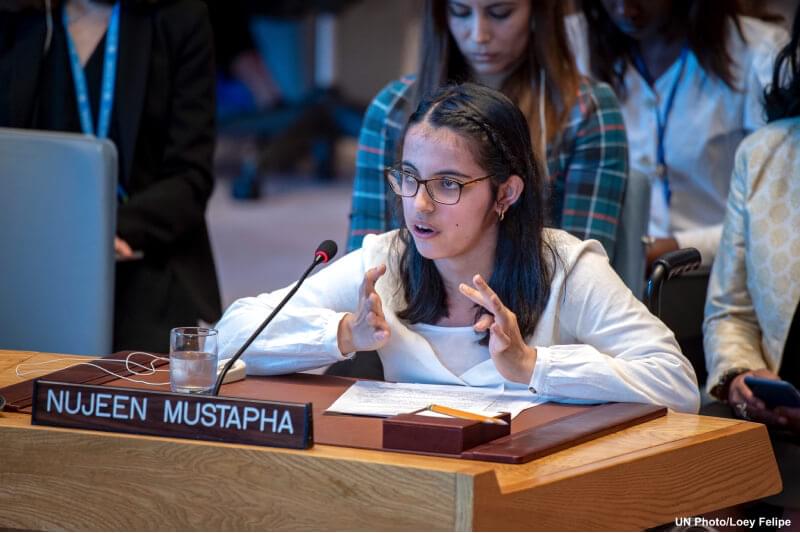
Changing the narrative in Russia
Crisis Action continued its efforts started last year to facilitate informed reporting by independent Russian journalists. This helped counter the Kremlin’s propaganda about its involvement in Syria’s war and put pressure on President Putin to back peace.
In February and March, Crisis Action helped organise trips by Russian human rights defenders and journalists to Lebanon, Turkey and Europe where they met and interviewed Syrian victims and witnesses of war crimes and human rights violations. Following one of these trips, key independent newspaper Novaya Gazeta published an extensive front-page report – the first in a series – arguing that Russia’s support for the Assad regime was untenable and should end.
In March, Crisis Action organised a forum in Berlin for over 40 activists, experts and opinion-shapers from Russia, Syria and Europe. Novaya Gazeta journalist, Olga Bobrova, told us afterwards that the forum discussions “allowed us to look at the people about whom we talked only in abstract before [and see them] as alive, active, working hard for peace and justice.”
The shift in Russian media coverage is starting to pay off: recent polling showed that, for the first time, a majority of Russians are opposed to their government’s military support for Assad. Furthermore, Russian Prime Minister Medvedev gave Olga Bobrova a high-profile media award. This demonstrates a significant change in the government’s attitude towards independent media, and suggests it recognises a need to engage with them and is listening to their reporting.
Crisis Action’s efforts to build personal connections with the independent Russian media have created invaluable partnerships based on mutual trust and respect. Their work has enabled us to humanise Russia’s involvement in Syria, allowing the Russian public to see ordinary Syrians not as abstract entities, but as living, breathing people working hard for peace and justice.
Journalist, Novaya Gazeta
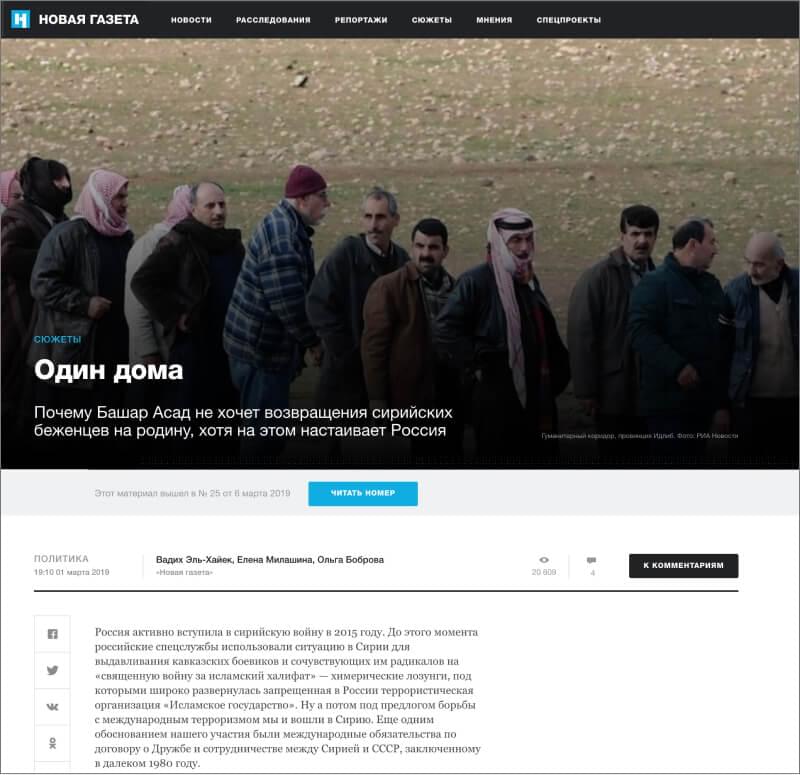
No normalisation
Crisis Action has also worked in the past year to prevent a resumption of normal, diplomatic relations between Syria and other countries in the absence of a political transition.
In September 2018, in advance of a key meeting on Syria at the UN, we supported a group of eminent jurists to issue a set of ten principles donors must uphold under international law should they consider support for reconstruction. Feedback from diplomats confirmed that the principles were influential in convincing them not to provide unconditional reconstruction funding, and in June 2019, the statement won the University of Essex’s 2019 Best International Research Impact award.
Crisis Action has also focused attention on the plight of detainees, in recognition that the security state in Syria is the greatest obstacle to refugees returning to Syria and should be used to deter western governments from resuming diplomatic relations. Ahead of a donor conference in Brussels in February 2019, Crisis Action supported Syrian and international organisations to brief diplomats, parliamentarians and the media. The conference declaration upheld their recommendations by urging the Syrian government “to free those arbitrarily detained, reveal the whereabouts of the disappeared, and allow access to detention facilities.”
In August 2019, for the first time ever, two former Syrian detainees – Amina Khoulani and Dr. Hala Al Ghawi from Families for Freedom – briefed the UN Security Council on their experiences. Crisis Action supported the women and ensured their briefing received considerable media attention, including in The Washington Post, The New York Times and Al-Arabiya. We also supported Amina and Hala to meet privately with high-level decisions makers to push for a UN resolution on detainees.
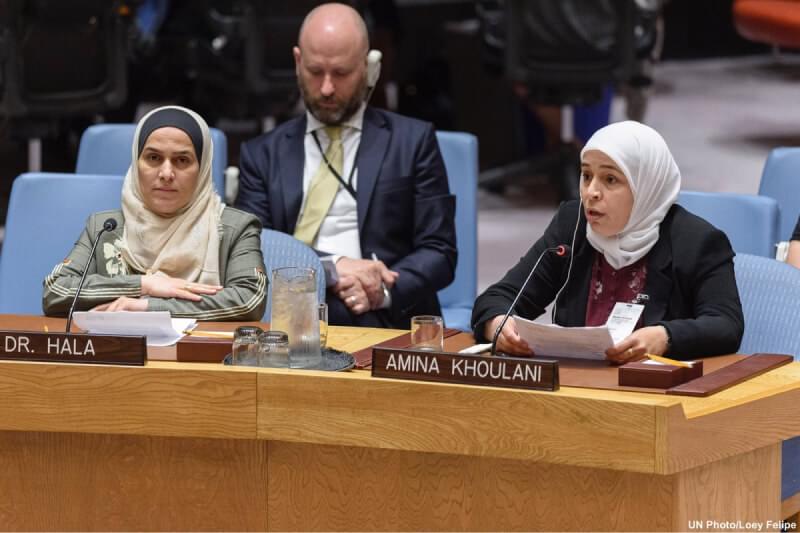
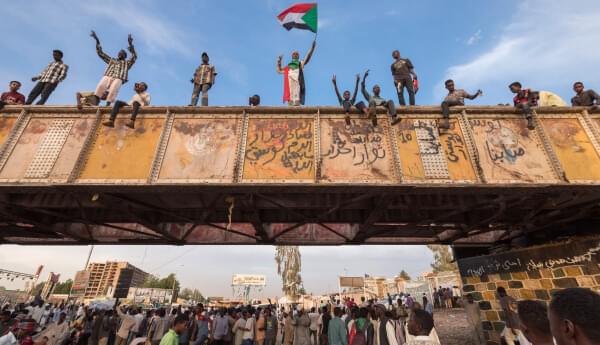
Sudan
Emergency Response
In addition to our core campaigns, Crisis Action retains capacity to scale up quickly to help prevent or rapidly respond to new or escalating conflicts.
Impact
In the wake of months of anti-government protests, which culminated in the overthrow of long-time President Omar al-Bashir, Crisis Action launched an emergency response on Sudan in April 2019 to urge a peaceful transition to civilian rule.
We focused efforts on encouraging the AU to listen to Sudanese civil society and insist that the military hand power to civilians.
Crisis Action facilitated three separate civil society statements, the demands of which were reflected in two strong statements from the AU, calling for a transition to civilian rule and setting a deadline for the handover. We also supported partners to produce two shadow reports to the AU on the progress towards transition.
We arranged for four Sudanese civil society delegates to brief the AU Commission, members of the Peace and Security Council, and diplomatic missions in Addis Ababa. Their testimony was hugely influential, with one ambassador telling us that he “could not betray” the delegates when voting to suspend Sudan from the AU.
Behind the scenes, Crisis Action facilitated a private letter to the AU Peace and Security Council from eight eminent Africans, and spurred leading business people to telephone AU officials and ministers on the eve of a critical vote and privately appeal for action to save lives.
On June 6, the AU suspended Sudan from the organisation and indicated its willingness to impose targeted sanctions. In July 2019, the Sudanese military agreed to form a civilian-led transitional government, which was the original objective of Crisis Action’s emergency response.
Working With Crisis Action
Reem Abbas is an award-winning Sudanese journalist, blogger and campaigner on issues including human rights and gender equality.

Women were at the heart of the protests that ousted Sudan’s President Omar al-Bashir from office. But then we were sidelined in the talks that followed with the Transitional Military Council who took over from the President. So I knew when I was invited to join a delegation to the AU to call for a peaceful transition of power, it was an opportunity I had to take.
The prospect of meeting dignitaries from the AU and neighbouring nations was daunting. I communicate with thousands of people every day in my work as a journalist and blogger, but the thought of public speaking and high-level political meetings terrified me.
Crisis Action’s Director in Addis Ababa was really helpful. She briefed me and my fellow delegates about who we would meet and the different roles we could play. We were encouraged to speak from the heart, having lived through the years of oppression and seen people’s suffering. We transformed from three individuals into a powerful team.
As we prepared, the situation on the streets of Khartoum got worse, with peaceful protests met with violent crackdowns by the rapid support forces. The Sudan Doctors' Committee documented 70 cases of rape on one day alone, and sexual harassment and violence against female protesters was rife.
Crisis Action was able to get meetings with all the right people and to get results. Those we met expressed deep gratitude for the information we shared. We insisted the AU had to act in support of peace in Sudan and that any peace worth the name had to recognise the rights and leadership of women.
Seeing AU ambassadors and other officials act on our briefings and push Sudan towards a peaceful transition of power – at a time when things could so easily have gone the other way – was hugely rewarding.
Of course, peace and gender equality are by no means guaranteed. But with a new Prime Minister in place, the prospects are better than they have been for decades. I will continue to hold the new Prime Minister and government to account through my journalism, and use my new-found presentation skills to reach new audiences on YouTube. I’m also going to write a book about the uprising. And if necessary, I will go back to the front line and protest for peace, for my fellow women, and for the Sudanese people.
Emergency Responses
In addition to our core campaigns, Crisis Action retains capacity to scale up quickly to help prevent or rapidly respond to new or escalating conflicts.
Cameroon
In the lead-up to the Cameroonian elections in October 2018, Crisis Action launched an emergency response to the escalating conflict, which had seen horrific levels of violence and widespread displacement of civilians. The aim of the campaign was to get incumbent President Paul Biya and Anglophone separatist leaders to engage in a mediated dialogue.
A significant achievement of this short action was our bringing together of Anglophone and Francophone civil society organisations to co-strategise and work together towards promoting peace.
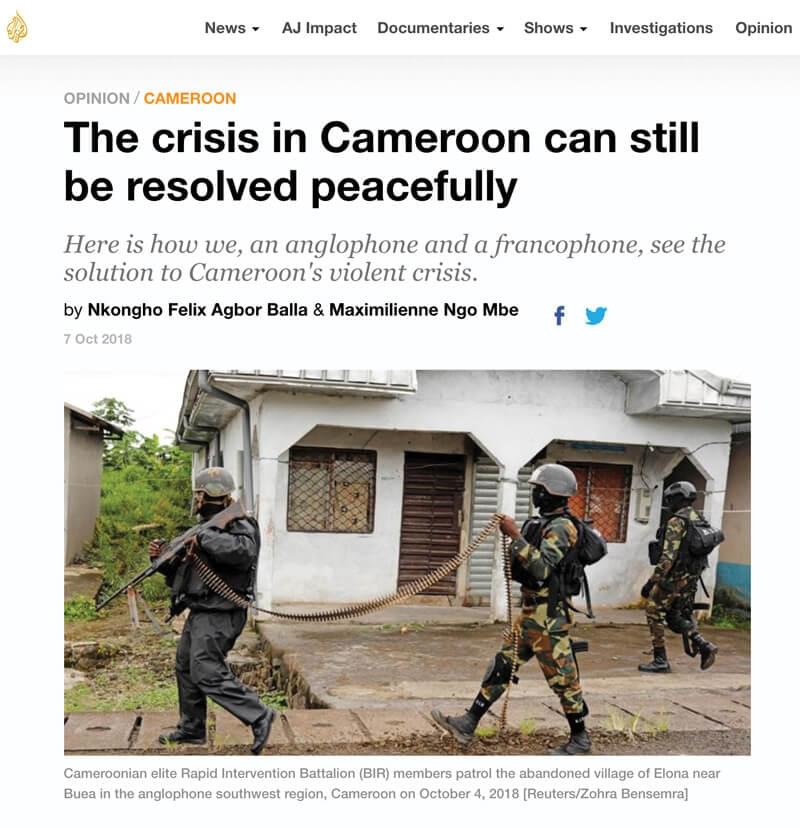
Venezuela
In March 2019, following a partner consultation, Crisis Action launched an emergency response on the humanitarian crisis in Venezuela, where over seven million people are in need of urgent assistance, and from which four million people have already fled.
This was Crisis Action’s first initiative on Latin America and our goal was to get aid to those in need. We supported partners to urge the UN to scale up its response, and to ask key governments to use their influence with Venezuela to get them to accept international humanitarian assistance.
We coordinated a private letter to members of the European-led International Contact Group on Venezuela, urging them to demand greater humanitarian access and a scaled-up response. The letter was well received and soon afterward, the group issued a joint statement including strong demands to tackle the humanitarian crisis. In addition, we facilitated several visits from leading Venezuelan humanitarian, Feliciano Reyna of Acción Solidaria, to brief key UN officials and diplomatic missions.
Digital Action
Smart collective action can save lives. It can also protect democracies.
Complex problems cannot be resolved by any single organisation acting alone. That’s why Crisis Action builds powerful coalitions from a global network of inspirational organisations and individuals. We seek no public profile so we can be the honest broker for our partners, focused only on what makes civilians safer. The power of this behind-the-scenes, strategic convening model could apply not only to saving civilians in conflicts, but to other global issues like climate change, education and digital threats to democracy.
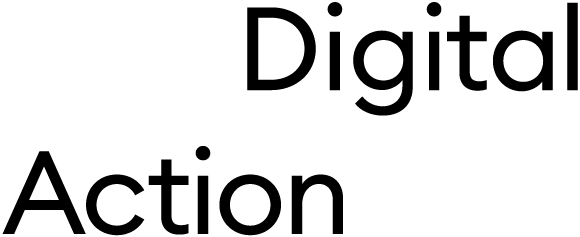
In 2019, people’s struggle for human rights, equality and representation around the world was partially enabled by, and played out on, digital platforms. Peaceful protests were met by violence and digital blackouts, including in India, Hong Kong, Zimbabwe and Sudan. It is timely therefore, that Crisis Action has helped to form a new organisation, Digital Action, to use our model of creative coalitions to tackle digital threats to democracy.
With support from the Ford Foundation, MacArthur Foundation, Luminate and Open Society Foundation, Digital Action will replicate the Crisis Action way of working to unlock ambitious collective action and drive change that strengthens democratic rights in a digital age. Digital Action will work to push back against digital threats to democracy, such as the weaponisation of digital platforms to destabilise and radicalise society, and irresponsible data gathering and inscrutable algorithms.
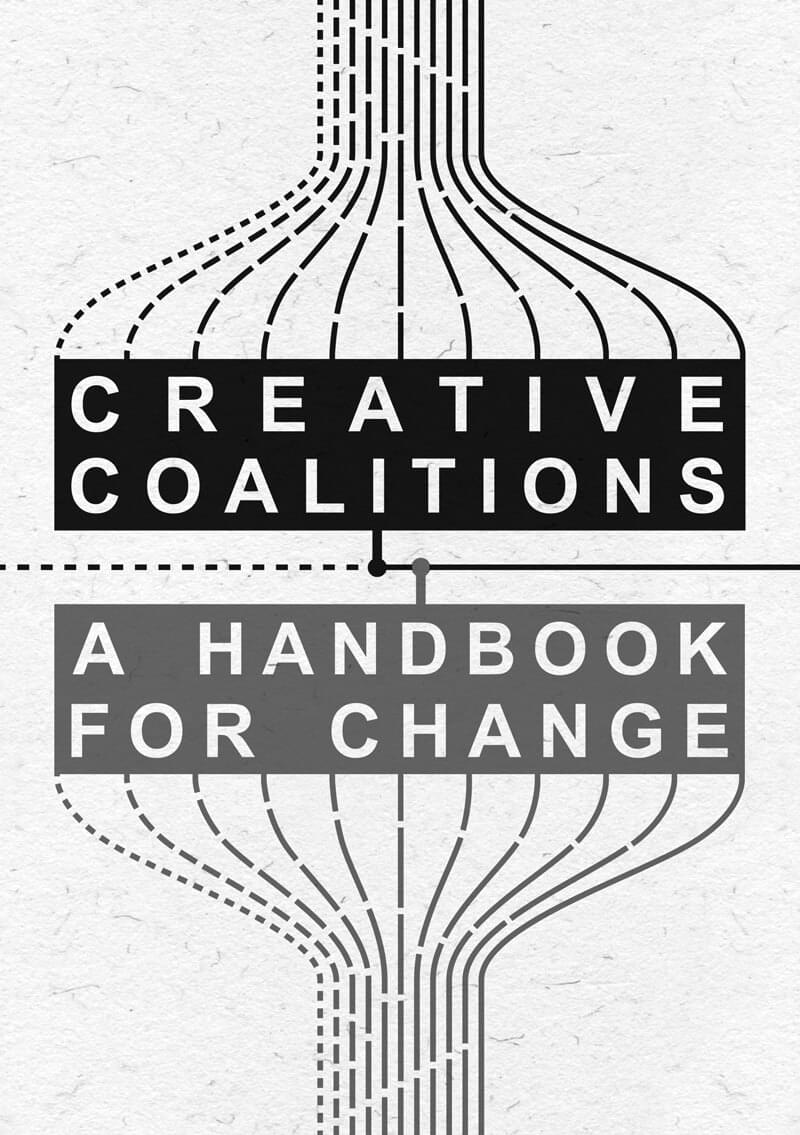
Find out more at digitalaction.co and read about the Crisis Action model at creativecoalitions.org.

Board
View full details of our board members on the main Crisis Action website, or click on any board member below.
Donors and Philanthropic Partners
Crisis Action's financial support comes from a range of foundations, governments and private individuals, many of which provide unrestricted multi-year funding. In addition, all of Crisis Action's core partners make an annual financial contribution, with the exception of those located in the Global South. To ensure the organisation's financial viability and safeguard its integrity and independence, we are continuously expanding and diversifying our donor base.
Thank you to all of our donors, who appear below, for making our work possible.
Foundations and Individuals
- Berghof Foundation
- Catherine Zennstrom
- Eagle Fund
- Greater Houston Community Foundation (Stardust Fund)
- Greenbaum Foundation*
- Heinrich Böll Foundation
- Joseph Rowntree Charitable Trust
- Kerfuffle Foundation*
- Lode Star Foundation
- MacArthur Foundation*
- Nduna Foundation*
- New Venture Fund
- Oak Foundation*
- Open Society Foundations
- Pears Foundation*
- Robert Bosch Stiftung
- Rockefeller Brothers Fund
- Sigrid Rausing Trust*
- Silicon Valley Community Foundation
- Skoll Foundation
- Stanley and Marion Bergman Family Charitable Fund
- Susan Gibson
* Crisis Action is especially grateful to these donors for providing us with unrestricted multi-year support
Governments
- Australian Permanent Mission to the United Nations, New York
- Department of Foreign Affairs and Trade, Ireland (Stability Fund)
- European Union and German Federal Foreign Office as part of the Syria Peace Initiative, implemented by the GiZ
- Global Affairs Canada
- Ministry of Foreign Affairs of the Netherlands
- Swedish Ministry for Foreign Affairs
Statement of Activities
For the year ended 31st May 2019
Scroll right to view full table
| 2019 (£) | 2018 (£) | 2019 ($) | 2018 ($) | |
|---|---|---|---|---|
| Income | ||||
| Funders & Donations | 3,764,284 | 3,318,348 | 4,747,214 | 4,414,896 |
| Partners | 129,707 | 97,181 | 163,576 | 129,294 |
| Interest | 5,309 | 7,731 | 6,695 | 10,286 |
| Total | 3,899,300 | 3,423,260 | 4,917,485 | 4,554,476 |
| Expenditure | ||||
| Salaries & Related Costs | 2,600,611 | 2,432,035 | 3,279,682 | 3,235,701 |
| Occupancy | 252,672 | 246,797 | 318,650 | 328,351 |
| Travel & Travel Related Costs | 458,587 | 280,946 | 578,333 | 373,785 |
| IT, Comms & Office Supplies | 169,877 | 154,637 | 214,235 | 205,737 |
| Publications | 78,744 | 20,803 | 99,306 | 27,677 |
| Events | 24,135 | 102,532 | 30,438 | 136,414 |
| Professional Fees | 99,821 | 89,882 | 125,886 | 119,583 |
| Asset Write-Off | 16,075 | 20,159 | 20,272 | 26,821 |
| Finance Charges | 9,343 | 90,883 | 11,782 | 120,915 |
| Depreciation | 5,531 | 4,550 | 6,975 | 6,053 |
| Total | 3,715,396 | 3,443,224 | 4,685,560 | 4,581,037 |
| (Deficit)/Surplus Before Taxation | 183,904 | (19,964) | 231,925 | (26,561) |
| Taxation | (1,009) | (1,468) | (1,272) | (1,953) |
| (Deficit)/Surplus After Taxation | 182,895 | (21,432) | 230,653 | (28,514) |
| Total Funds brought forward | 1,118,379 | 1,139,811 | 1,410,410 | 1,516,462 |
| Total Funds carried forward | 1,301,274 | 1,118,379 | 1,641,063 | 1,487,947 |
| Exchange Rate at 31st May 2019 (USD) | 1.26112 | |||
| Exchange Rate at 31st May 2018 (USD) | 1.3305 | |||
Income 2018/19
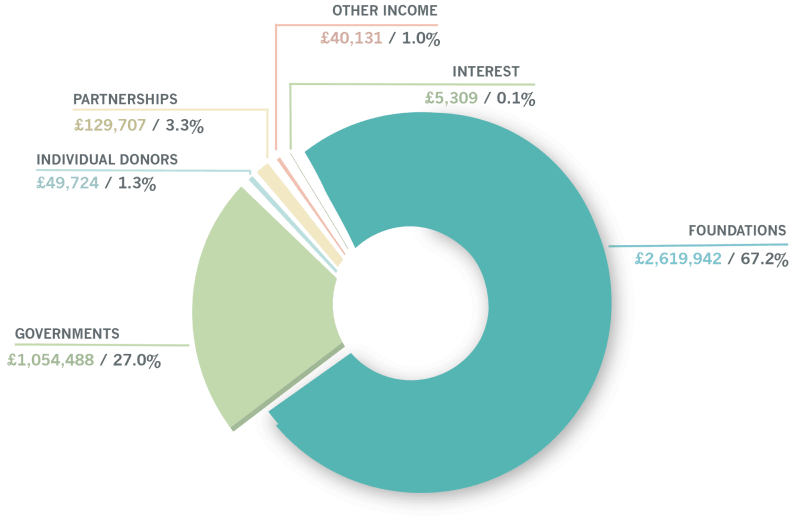
Scroll right to view full table
| 2019 (£) | 2018 (£) | 2019 ($) | 2018 ($) | |
|---|---|---|---|---|
| Fixed Assets | 17,573 | 23,104 | 22,162 | 30,739 |
| Debtors1 | 224,834 | 267,655 | 283,543 | 356,102 |
| Cash at Bank | 2,103,020 | 2,126,636 | 2,652,160 | 2,829,383 |
| Creditors2 | (1,044,153) | (1,299,016) | (1,316,802) | (1,728,276) |
| Net Assets | 1,301,274 | 1,118,379 | 1,641,063 | 1,487,947 |
| Capital & Reserves | ||||
| Operating Overhead Reserve3 | 1,576,440 | 1,425,917 | 1,988,080 | 1,897,111 |
| Restricted Funds | 39,388 | 11,901 | 49,673 | 15,834 |
| Unrestricted Funds4 | (314,554) | (319,439) | (396,690) | (424,998) |
| Capital & Reserves | 1,301,274 | 1,118,379 | 1,641,063 | 1,487,947 |
- £164,139 ($206,999) of Debtors are grants due in 2018/19 but received in 2019/20.
- £806,433 ($1,017,009) of Creditors is the amount of deferred income carried forward into 2019/20.
- The opening USD reserves have been revalued using the May 2019 USD/GBP exchange rate.
- Unrestricted funds includes three shares with a nominal value of £1. These shares are owned by the directors and do not earn dividends.
Core Partners
- 11.11.11
- Action Contre la Faim (ACF)
- Aegis Trust
- African Centre for Justice and Peace Studies (ACJPS)
- African Research and Resources Forum (ARRF)
- Agency for Cooperation on Research in Development (ACORD)
- Amnesty International
- Amnesty UK
- Arab NGO Network for Development (ANND)
- Arab Programme for Human Rights Activists
- Arabic Network of Human Rights Information (ANHRI)
- Cairo Institute for Human Rights Studies (CIHRS)
- CARE France
- CARE International UK
- Catholic Agency for Overseas Development (CAFOD)
- Center for Civilians in Conflict (CIVIC)
- Center for Conflict Resolution (CECORE)
- Centre for Democracy and Development
- Christian Aid
- Concern - UK
- Cordaid
- Finn Church Aid
- Global Centre for the Responsibility to Protect (GCR2P)
- Human Rights Information & Training Center (HRITC)
- Human Rights Watch (HRW)
- Humanitarian Aid Relief Trust (HART)
- Humanity and Inclusion
- IHH (Insani Yardim Vakfi) (Humanitarian Relief Foundation)
- Institute for Security Studies (ISS)
- International Centre for Policy and Conflict (ICPC)
- International Crisis Group
- International Medical Corps UK
- International Refugees Rights Initiative (IRRI)
- International Rescue Committee
- Islamic Relief Worldwide
- KontraS
- Mensen met een Missie
- Mercy Corps
- Nobel Women's Initiative
- Nonviolent Peaceforce
- Norwegian Refugee Council (NRC)
- Oxfam International
- PAX
- Permanent Peace Movement
- Physicians for Human Rights
- Refugees International
- Saferworld
- Save the Children - UK
- Save the Children - US
- Stichting Vluchteling
- Support to Life
- Tearfund
- The Elders
- Trócaire
- War Child – Netherlands
- War Child – UK
- West Africa Network for Peacebuilding (WANEP)
- Women International Peace Centre
- World Vision International
- World Vision UK
Campaign Partners
- Acción Solidaria
- Action Des Chretiens Pour L’Abolition De La Torture (ACAT)
- Adopt a Revolution
- Africans Rising
- Alliance Internationale pour la défense des droits et libertés (AIDL)
- Articulação SUL
- Assistance Mission for Africa (AMA)
- Association of Evangelicals in Africa (AEA)
- Baytna Syria
- Better World Campaign
- Center for Justice and International Law (CEJIL)
- Centre for Humanitarian Dialogue
- Centro de Justicia y Paz (CEPAZ)
- Community Empowerment for Progress Organization (CEPO)
- Daughters of Mumbi Global Resource Center
- Dawlaty
- Denis Hurley Peace Institute
- Dialogue and Research Initiative (DRI)
- End Impunity Organization (EIO)
- Enough Project
- Euromed Rights – Euro-Mediterranean Network For Human Rights
- EVE Organization
- Families for Freedom
- Fellowship of Christian Councils and Churches in the Great Lakes and Horn of Africa (FECCLAHA)
- FEMNET
- Friends Committee on National Legislation
- Hand in Hand for Syria
- Help4Syria
- Human Rights Documentation Organization (HURIDO)
- Human Rights First
- Institute for Justice and Reconciliation (IJR)
- International Commission of Jurists
- International Medical Corps USA
- International Youth for Africa (IYA)
- medico international
- Mwatana Organization for Human Rights
- Najda Now
- National Security Action
- Observatoire des Armements
- Pan African Lawyers Union (PALU)
- Peace Coalition for South Sudan (PECOSS)
- People in Need (PIN)
- Relief & Reconciliation for Syria
- Revivre
- SaferYemen
- Salam for Yemen
- Sana'a Center for Strategic Studies
- Sawa Association for Development and Aid
- Search for Common Ground
- South Sudan Action Network on Small Arms (SSANSA)
- South Sudan Women's Empowerment Network (SSWEN)
- Sudan Focal Point Europe
- Syria Bright Future
- Syria Relief
- Syria Relief & Development (SRD)
- Syrian American Medical Society
- The Sentry
- The Syria Campaign
- The Washington Office on Latin America (WOLA)
- Union des Organisations de Secours et Soins Médicaux (UOSSM)
- United States Institute of Peace (USIP)
- Violations Documentation Center in Syria (VDC)
- Win Without War
- Wogood for Human Security
- Women Now for Development
- Yemen Solidarity Network
Our Network
View the complete network list on the main Crisis Action website.
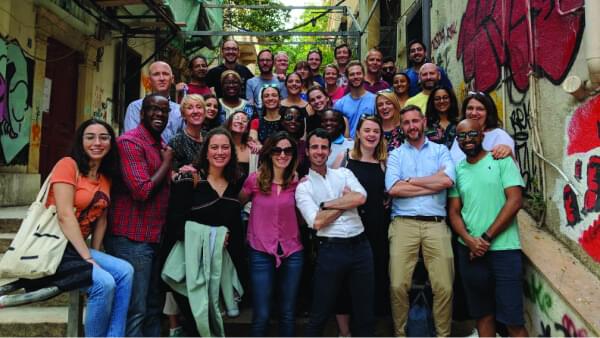
Our Team
Our Staff
For a full list of all our staff, please view the team page on our main website.
15 Years of Crisis Action
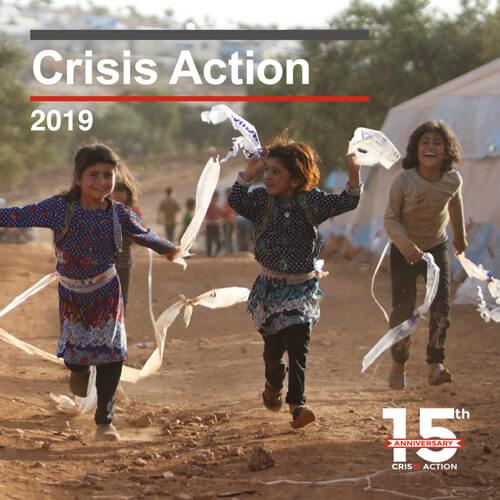
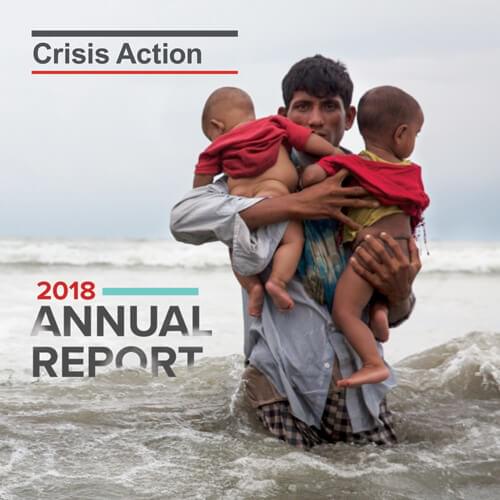
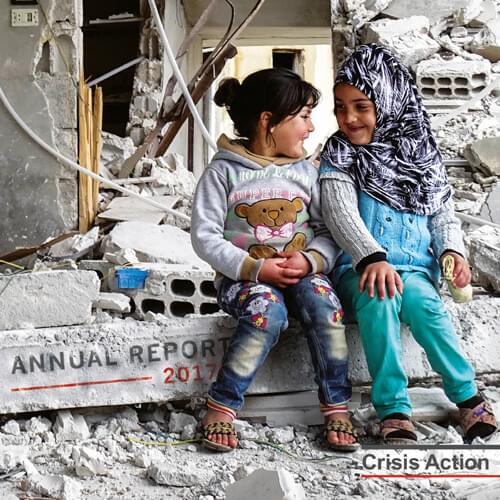
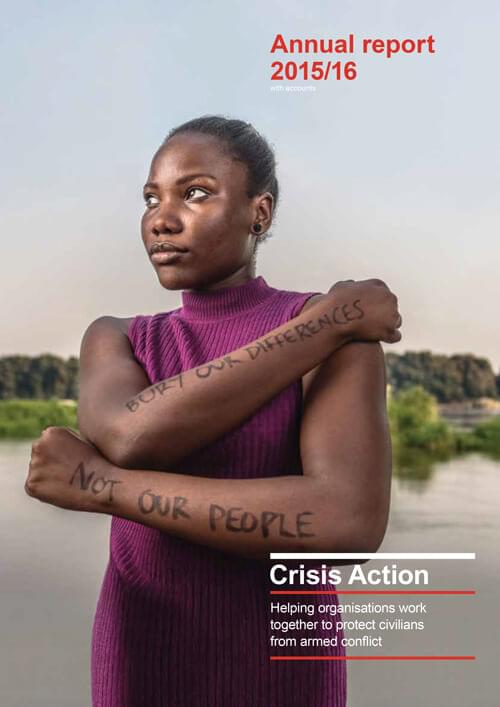
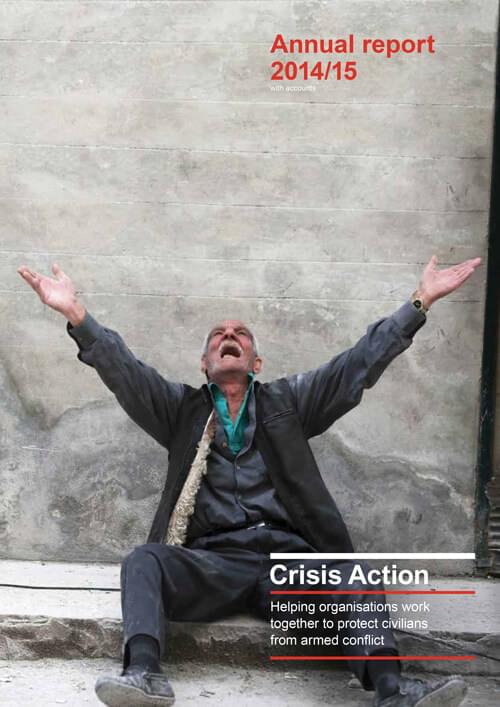
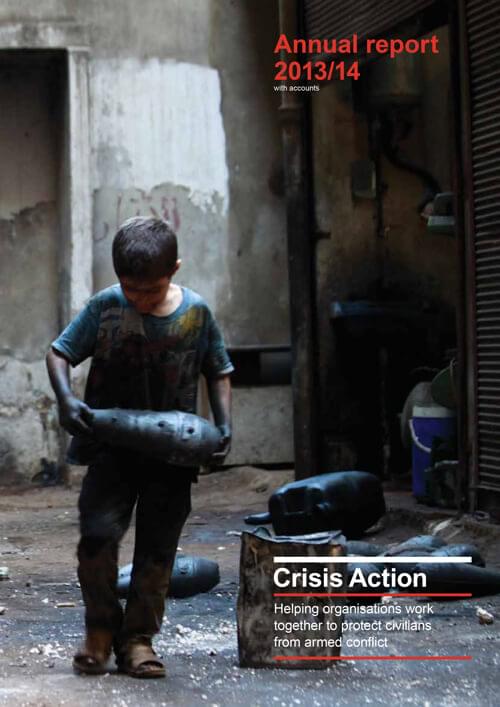
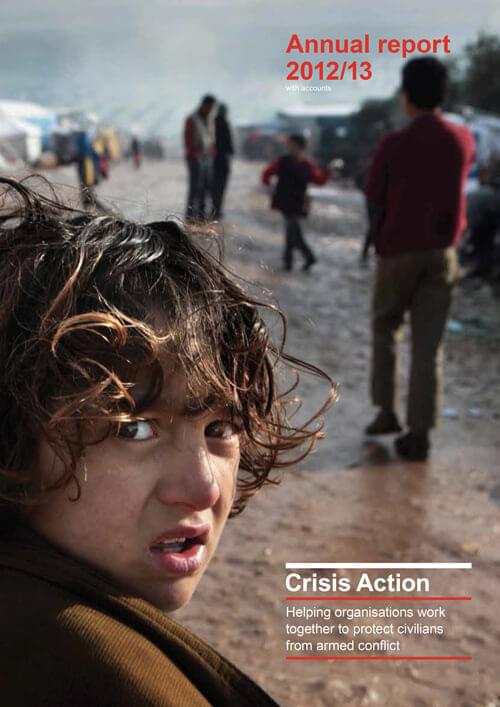
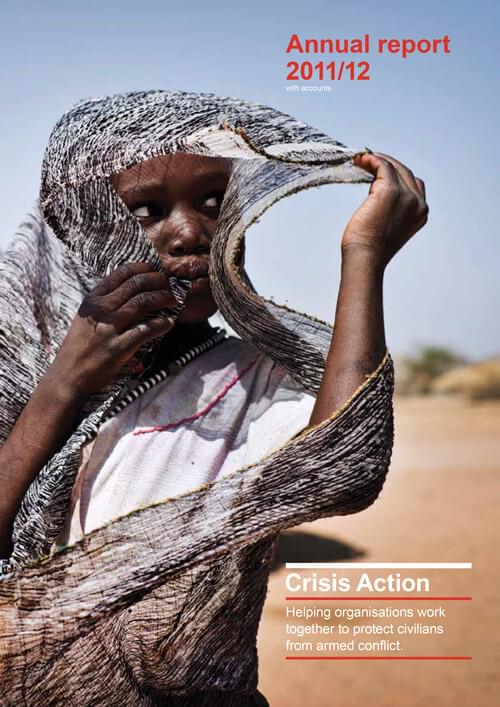
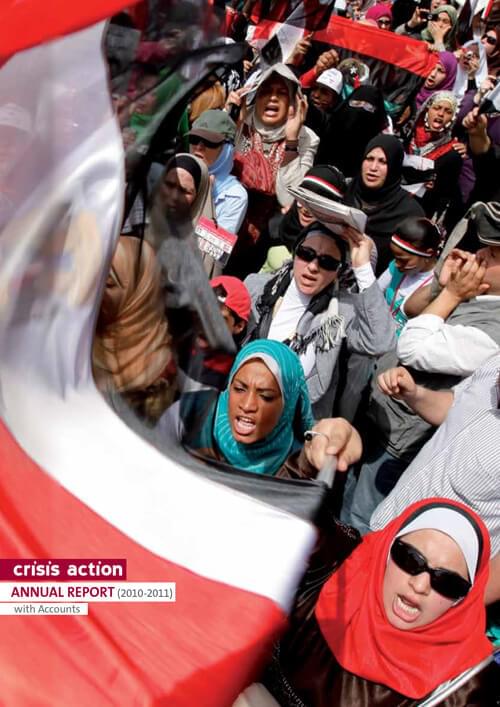
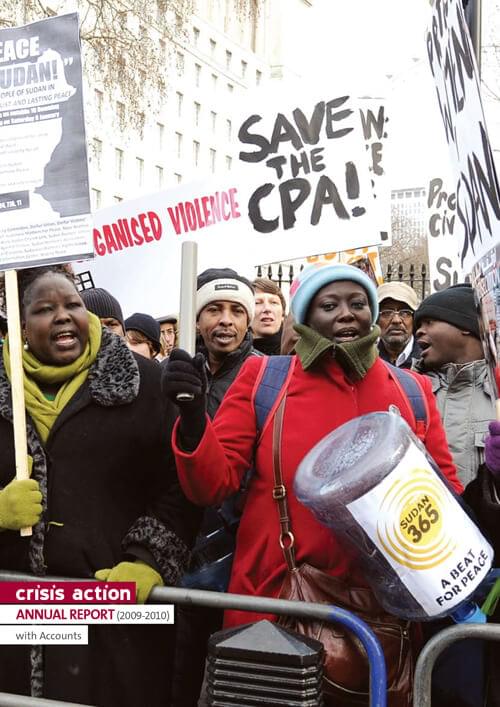
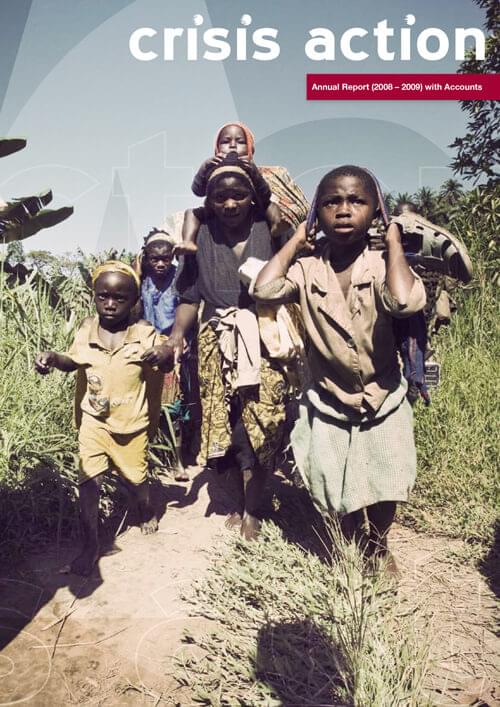
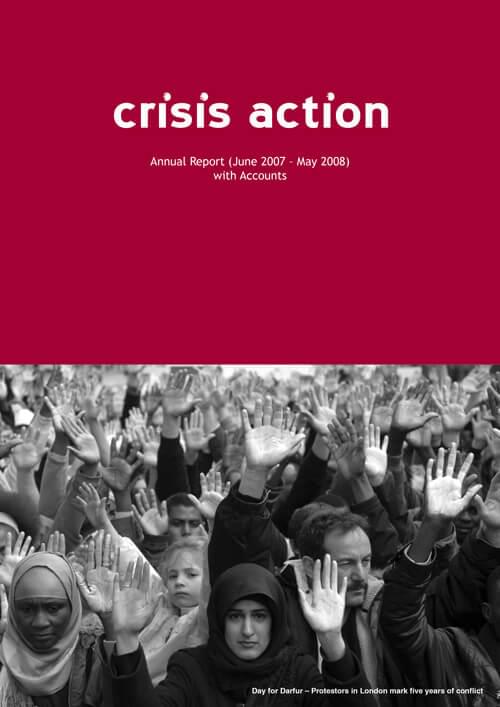
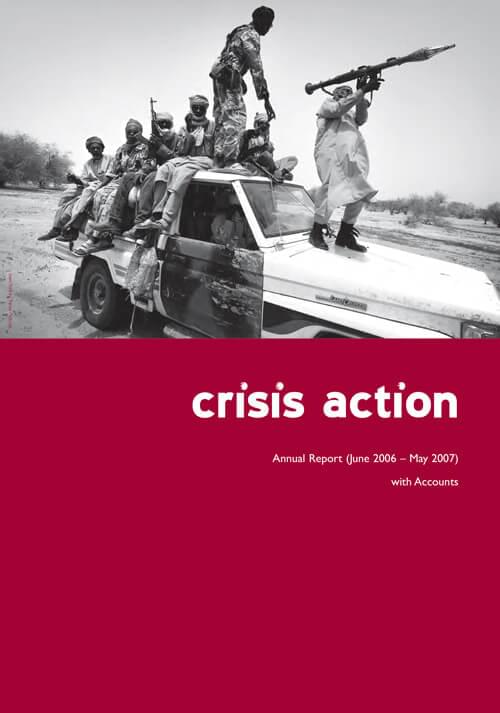
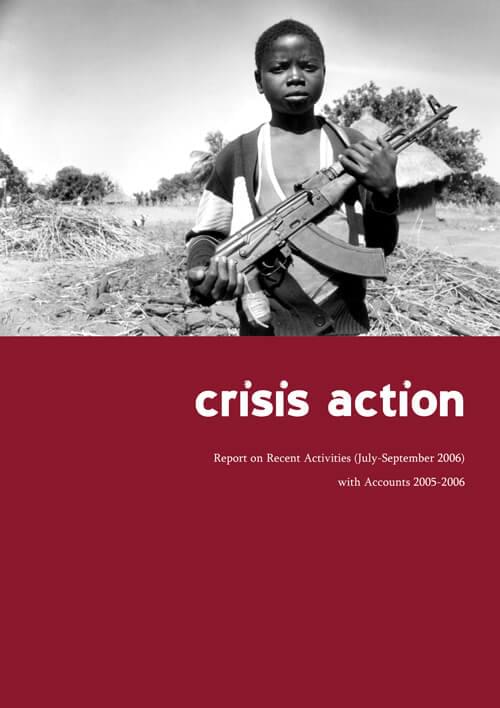
Thank You
We would like to thank the following consultants, interns and former employees for their contribution to Crisis Action’s work over the past year:
- Alaa Ahmed
- Amen Deneke
- Amy Barry
- Benson Kaduki
- Camilla Davila
- Cara Priestley
- Catherine Penda
- Chakera McIntosh
- Chelangat Rutto
- Claire Albiez
- Conor O’Loughlin
- Diala Ghneim
- Ebony Ross Elvis Salano
- Emebet Getachew
- Jennifer Dhanraj
- Jessica Doumit
- Joel Kimari
- Julia Kuperminc
- Kelly Petillo
- Lawrence Robinson
- Lena Cohrs
- Madu Gebermeskel
- Margaux Schulz
- Maria-Charito Mertz Marianne Tessa
- Marie Peschard
- Maryanne Kamoche
- Morgan Cronin-Webb
- Nada Ismail
- Nicole Maloba
- Nick Martlew
- Nour Zargouni
- Nyathon Mai
- Olivia Njoroge
- Otieno Adipo Sidang
- Rebecca Gibbons
- Richard Alam
- Robert Schupp
- Ruth Price
- Shilpa Venigandla
- Soraya Fettih
- Stefanie Barczy
- Susanne Baumann
- Tamara Bazih
- Yasmine Fawaz
2019 Annual Report:
- Cover image: Syrian children play in a camp for internally displaced people in northern Idlib on the eve of Eid al-Fitr, which marks the end of the Muslim holy fasting month of Ramadan (photo by AAREF WATAD/AFP/Getty Images)
- Illustrations, graphic design and layout by Suketchi Branding & Design Agency
- Copywriting and editing by di:ga
- Website by Lumpy Lemon

